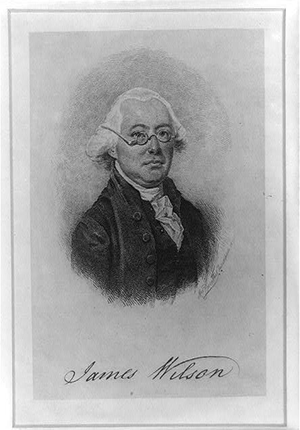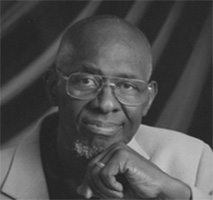Historic Document
Speech at a Public Meeting in Philadelphia (1787)
James Wilson | 1787

Library of Congress, Prints and Photographs Division
Summary
As soon as the Constitution was presented to the public, it was met with an onslaught of criticism that its defenders would need to counter. It initially fell to the Constitution’s champions based in Pennsylvania, site of the Constitutional Convention, to devise a response, and none proved more influential than the one issued by James Wilson in a public speech delivered in the Pennsylvania State House Yard. The first public defense of the Constitution, Wilson’s speech would be reprinted in over thirty newspapers across every state in the next two months alone. It became best known for Wilson’s justification for why the Constitution lacked a bill of rights. Because, in constituting a federal government, any powers not positively delegated were reserved by the people, a bill of rights was unnecessary, and worse, dangerous, for anything omitted from an enumeration of rights could be treated as undeserving of protection.
Selected by

William B. Allen
Emeritus Dean of James Madison College and Emeritus Professor of Political Science at Michigan State University

Jonathan Gienapp
Associate Professor of History at Stanford University
Document Excerpt
Mr. Chairman and Fellow Citizens, Having received the honor of an appointment to represent you in the late convention, it is perhaps, my duty to comply with the request of many gentlemen whose characters and judgments I sincerely respect, and who have urged, that this would be a proper occasion to lay before you any information which will serve to explain and elucidate the principles and arrangements of the constitution, that has been submitted to the consideration of the United States. I confess that I am unprepared for so extensive and so important a disquisition; but the insidious attempts which are clandestinely and industriously made to pervert and destroy the new plan, induce me the more readily to engage in its defence; and the impressions of four months constant attention to the subject, have not been so easily effaced as to leave me without an answer to the objections which have been raised.
It will be proper however, before I enter into the refutation of the charges that are alledged, to mark the leading descrimination between the state constitutions, and the constitution of the United States. When the people established the powers of legislation under their separate governments, they invested their representatives with every right and authority which they did not in explicit terms reserve; and therefore upon every question, respecting the jurisdiction of the house of assembly, if the frame of government is silent, the jurisdiction is efficient and complete. But in delegating fœderal powers, another criterion was necessarily introduced, and the congressional authority is to be collected, not from tacit implication, but from the positive grant expressed in the instrument of union. Hence it is evident, that in the former case every thing which is not reserved is given, but in the latter the reverse of the proposition prevails, and every thing which is not given, is reserved. This distinction being recognized, will furnish an answer to those who think the omission of a bill of rights, a defect in the proposed constitution: for it would have been superfluous and absurd to have stipulated with a fœderal body of our own creation, that we should enjoy those privileges, of which we are not divested either by the intention or the act, that has brought that body into existence. For instance, the liberty of the press, which has been a copious source of declamation and opposition, what controul can proceed from the fœderal government to shackle or destroy that sacred palladium of national freedom?…it would have been merely nugatory to have introduced a formal declaration upon the subject—nay, that very declaration might have been construed to imply that some degree of power was given, since we undertook to define its extent. …
After all, my fellow citizens, it is neither extraordinary or unexpected, that the constitution offered to your consideration, should meet with opposition. It is the nature of man to pursue his own interest, in preference to the public good; and I do not mean to make any personal reflection, when I add, that it is the interest of a very numerous, powerful, and respectable body to counteract and destroy the excellent work produced by the late convention. All the offices of government, and all the appointments for the administration of justice and the collection of the public revenue, which are transferred from the individual to the aggregate sovereignty of the states, will necessarily turn the stream of influence and emolument into a new channel. Every person therefore, who either enjoys, or expects to enjoy, a place of profit under the present establishment, will object to the proposed innovation; not, in truth, because it is injurious to the liberties of his country, but because it affects his schemes of wealth and consequence. I will confess indeed, that I am not a blind admirer of this plan of government, and that there are some parts of it, which if my wish had prevailed, would certainly have been altered. But, when I reflect how widely men differ in their opinions, and that every man (and the observation applies likewise to every state) has an equal pretension to assert his own, I am satisfied that any thing nearer to perfection could not have been accomplished. If there are errors, it should be remembered, that the seeds of reformation are sown in the work itself, and the concurrence of two thirds of the congress may at any time introduce alterations and amendments. Regarding it then, in every point of view, with a candid and disinterested mind, I am bold to assert, that it is the best form of government which has ever been offered to the world.




